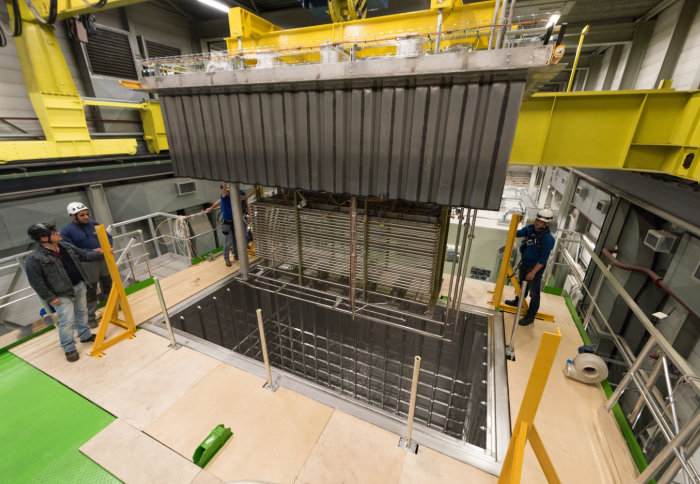
A small prototype detector for DUNE

Researchers at Imperial are starting work on a huge new neutrino experiment, aiming to understand the origin and structure of the universe.
The Deep Underground Neutrino Experiment (DUNE), to be assembled in the US, will have components designed and built by institutions across the UK, including Imperial.
DUNE will be a much more powerful experiment, capable of turning our initial hints into significant discoveries and precise measurements. Professor Morgan Wascko
The experiment brings together more than 1,000 physicists across 30 countries, and ground was broken on construction for one part of the experiment in Fermilab in Chicago this week.
One aim of the experiment will be looking at the behaviour of particles called neutrinos and their antimatter counterparts, antineutrinos. This could provide insight as to why we live in a universe dominated by matter, rather than antimatter, and inform the debate on why the universe survived the Big Bang.
Using a particle accelerator, an intense beam of neutrinos will be fired 800 miles through the Earth from Fermilab in Chicago to the Sanford Underground Research Facility (SURF) in South Dakota. There the incoming beam will be studied using DUNE’s liquid-argon detectors.
Significant discoveries
DUNE will build on results from the T2K experiment – a similar neutrino oscillation experiment that fires a beam of neutrinos across Japan, and has hinted at some key differences between matter and antimatter version of neutrinos.
Professor Morgan Wascko, from the Department of Physics at Imperial, said: “Our neutrino results from the T2K experiment in Japan have been a pleasant surprise, showing a hint that there might be a very large difference in the behaviour of neutrinos and antineutrinos. DUNE will be a much more powerful experiment, capable of turning our initial hints into significant discoveries and precise measurements.”
DUNE is a flagship international experiment run by the United States Department of Energy’s Fermilab. Various elements of the experiment are under construction across the world, with the UK taking a major role in contributing essential expertise and components to the experiment and facility.
Announced this week, the new £30m investment in DUNE from UK Research and Innovations’ Science and Technology Facilities Council (STFC) is made up of four-year construction grants to 13 institutions, including Imperial. The work includes producing over 150 Anode Plane Assemblies (APAs), the largest components of the DUNE detectors, as well as the data acquisition system that collects the data created by the state-of-the-art detectors.
World-leading expertise
The Imperial College London High Energy Physics Group has world-leading expertise in data acquisition systems for particle detectors, building on long experience in the CMS collaboration at CERN.
The DUNE APAs produce data in the form of electronic signals, which are digitised by specialist electronics. UK scientists on DUNE are leading the systems that read out these signals and safely store them for analysis.
Dr Alexander Tapper, from the Department of Physics at Imperial, explained some of the challenges that DUNE will face: "Each of the DUNE 10 kiloton (1000-ton) modules produces data at a rate of 1.5 terabytes per second, a huge volume of data that must be handled stably by the data acquisition system.
“The system will run all day, every day, so that we can collect neutrino interactions from the beam and also neutrinos from interesting astrophysical events like supernovae – if we are lucky enough to find one."
DUNE will also watch for neutrinos produced when a star explodes, which could reveal the formation of neutron stars and black holes, and will investigate whether protons live forever or eventually decay, bringing us closer to fulfilling Einstein’s dream of a grand unified theory.
Supporters

Article text (excluding photos or graphics) © Imperial College London.
Photos and graphics subject to third party copyright used with permission or © Imperial College London.
Reporter
Hayley Dunning
Communications Division

Contact details
Tel: +44 (0)20 7594 2412
Email: h.dunning@imperial.ac.uk
Show all stories by this author
Leave a comment
Your comment may be published, displaying your name as you provide it, unless you request otherwise. Your contact details will never be published.



Comments
Comments are loading...